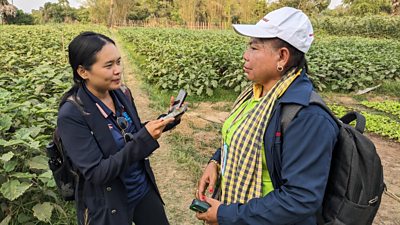Download the guides:
The Risk Communication for Early Action (RiCA) project, implemented by �鶹�� Media Action and delivered in partnership with United Nations Office for Disaster Risk Reduction (UNDRR), aimed to increase the capacity of target stakeholders to communicate about risk for early warning and early action. The project explored specific challenges and opportunities for media and communication to contribute to early warning and early action by focusing on three distinct areas for learning, in three select countries:
- Somalia: Conflict-affected populations
- Cambodia: Hard-to-reach populations
- Barbados: Connected and able to act: Populations and practitioners
The project engaged the following stakeholders necessary to create inclusive, responsive, and accountable early warning systems:
- National and sub-national governments and related departments;
- Media and communication professionals;
- Technical experts;
- Local community actors / civil society representatives.
The RiCA project delivered the following outputs:
- Practical resources (global tools and country specific resources) that stakeholders can use towards effective risk communication strategies.
- Convening and capacity strengthening for target stakeholders to share knowledge and build skills alongside their counterparts, forging new ways to collaborate on effective risk communication and early warning and early action.
Two global tools were developed as part of the RiCA project – the Pocket Guide to Disaster Risk Communication and the Guide to Essential Research, a companion to the Pocket Guide. The capacity strengthening workshops delivered as part of the project were based on the approach and principles for developing and enhancing disaster risk communication strategies outlined in the Pocket Guide. The workshops provided the opportunity to test the ‘understand’, ‘plan’, ‘do’ and ‘improve’ approach with stakeholders, gather their feedback, and refine both global tools. A summary of both global tools is provided below.
The workshop has really changed our mind and we received good guidance on the ways of using risk communication, early warning.”
The Pocket Guide's aim is to provide simple guidance and practical tips for practitioners, from any sector, who are planning effective disaster risk communication strategies that support early warning and early action.
The Pocket Guide will help you maximise investments in risk communication by:
• Designing communication that reflects behavioural science and informed decision making among populations
• Collaborating with practitioners across disciplines to prepare effective public communication strategies and content
The guide is primarily written for practitioners in low-income countries, assuming minimal resources, but the principles can be applied in almost any context. While it is not a comprehensive guide for how to manage complex challenges such as communicating uncertainty, visualising risk data or increasing trust, it signposts to key resources that provide in-depth insights on many important areas.
We can and should focus on working together with local media networks in disseminating information on weather broadcasts and announcements before any disasters take place.”
The practical Research Guide has been developed to help you gather essential research for developing your disaster risk communication plans to support early warning and early action. It gives you a range of areas to consider exploring, specifically in terms of understanding at-risk populations.
Each section of the guide outlines the key research questions to consider for investigation, and example resources for desk research. Where there is limited existing data, there are suggested research methods and interview questions for conducting your own research. This research aims to help you gain a deep understanding of your target population groups, underlying societal problems and media environments in your planned operating context.
The RiCA project was funded by USAID (United States Agency for International Development) and implemented between November 2023 and June 2024.
